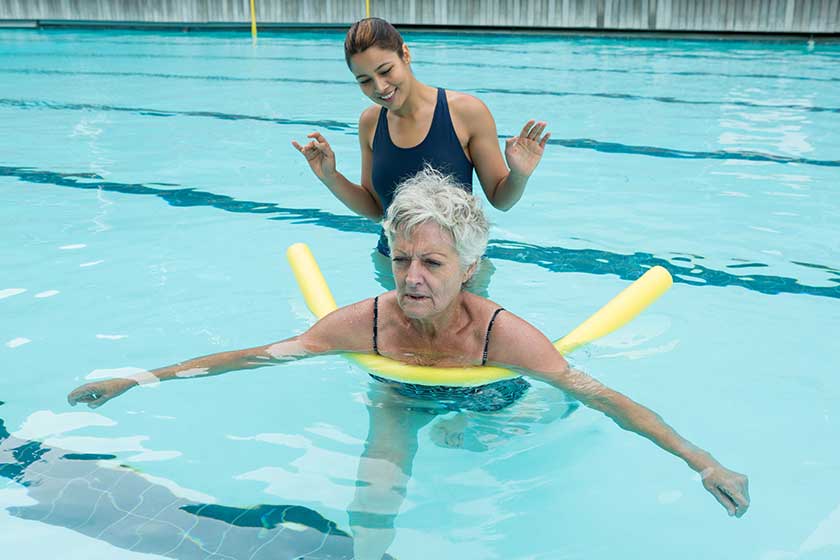Caring for a family member with dementia involves ensuring they remain engaged and active. Activity programs for dementia patients enhance their quality of life, provide mental and physical stimulation and foster a sense of purpose. These programs are designed with their unique needs, ensuring that your loved ones can enjoy meaningful experiences daily.
The Importance of Tailored Activity Programs
Tailored senior living programs are crucial for those with dementia as they help maintain cognitive functions, improve mood and reduce behavioral issues. These activities are crafted to be person-centered, focusing on the individual’s interests, abilities and history, ensuring that each experience is engaging and beneficial. Participating in such activities, your family members can experience a sense of accomplishment and joy, which is vital for their well-being.
Types of Activity Programs for Dementia Patients
- Physical Activities
Engaging in regular Dimensions health and wellness activities can greatly benefit individuals with dementia. Gentle exercises like walking, chair yoga and tai chi can improve mobility, balance and overall health. These activities are often adapted to meet each person’s physical capabilities, ensuring they can participate safely and effectively.
-
Cognitive Stimulation
Cognitive activities are designed to keep the mind active and engaged. Puzzles, memory game and problem-solving tasks can help maintain cognitive functions and slow the progression of dementia. These activities often incorporate elements familiar to the individual, such as family photos or favorite pastimes, making them more enjoyable and effective.
-
Social Engagement
Social activities play a vital role in the well-being of those with dementia. Group activities such as singing, arts and crafts and group discussions provide opportunities for social interaction, which can reduce feelings of isolation and depression. These activities are structured to foster a sense of community and belonging, allowing your loved ones to form meaningful connections with others.
Implementing Activity Programs
-
Creating a Routine
Establishing a consistent routine is crucial for individuals with dementia. A structured schedule that includes various daily activities can provide stability and predictability. This routine should balance physical, cognitive, social and sensory activities, ensuring a well-rounded approach to engagement. Creating a predictable routine can help your loved ones feel more secure and comfortable, reducing anxiety and confusion.
-
Personalizing Activities
Personalization is key to the success of activity programs for those with dementia. Understanding your family members’ interests, preferences and abilities allows you to tailor enjoyable and beneficial activities. This could mean incorporating favorite hobbies, music or past experiences into the activities. By focusing on what they love and what they can do, you ensure that each activity is meaningful and rewarding.
-
Involving Family Members
Family involvement is essential in activity programs. Encouraging family members to participate in activities can strengthen bonds and create joyful moments. Whether it’s joining in a game, helping with a craft or simply spending time together, family participation can enhance the experience for your loved ones. It also provides support and companionship, which is invaluable for their emotional well-being.
The Role of Professional Support
-
Trained Care Teams
Professional support is essential in the implementation of effective activity programs. Trained teams who understand the unique needs of individuals with dementia can provide guidance and supervision. Their expertise ensures that activities are safe, appropriate and beneficial. By relying on professional support, you can ensure your loved ones receive the best care and engagement.
-
Continuous Assessment
Regular assessment of the activity programs is crucial to ensure they continue to meet the needs of your family members. This involves evaluating their effectiveness and making adjustments as necessary. Continuous assessment helps identify changes in abilities or interests, allowing for timely modifications to the activities. This dynamic approach ensures that the programs remain relevant and beneficial over time.
Benefits of Activity Programs
-
Enhanced Quality of Life
Activity programs designed for dementia can significantly enhance the quality of life for your loved ones. They provide mental and physical stimulation, reduce behavioral issues and improve mood. By participating in these programs, individuals with dementia can enjoy a more fulfilling and enjoyable daily life.
-
Improved Cognitive Functions
Regular engagement in cognitive activities can help maintain and even improve cognitive functions. This can lead to better memory, attention and problem-solving skills. Cognitive activities provide mental challenges that keep the brain active and healthy.
-
Social and Emotional Benefits
Social interactions and emotional support are vital for individuals with dementia. Activity programs provide opportunities for social engagement, reducing feelings of isolation and depression. They also offer emotional support, helping individuals feel valued and understood.
-
Physical Health Benefits
Physical activities improve physical health by improving mobility, balance and overall fitness. Regular physical exercise can reduce the risk of falls and other health issues, ensuring a healthier and more active lifestyle.
At our Memory Care center, we understand the importance of such programs and are committed to offering the best possible care and support. Contact us today to learn more about how we can help enhance the quality of life for your loved ones. We invite you to visit and experience our compassionate and comprehensive approach to care.







